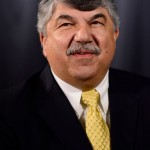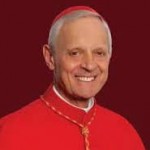Washington (PAI) – The Roman Catholic Church and the U.S. labor movement are working more closely together than ever, especially uniting on social justice, immigration and income inequality issues, leaders of the two say.

That’s because the social justice aims of U.S. workers largely coincide with those of the Church, on everything from immigration to workers’ rights, say AFL-CIO President Richard Trumka and Cardinal Donald Wuerl, archbishop of Washington, D.C.
The increasing cooperation between the two came through at a June 15 “Conversation on Solidarity and Faith” at the AFL-CIO, along with a brief Trumka-Wuerl press conference. The conversation attracted union activists and church leaders from dioceses nationwide.
The activism will last through and beyond the visit this September of Pope Francis I to the U.S. The pontiff is scheduled to stop in Philadelphia, New York and D.C., and possibly elsewhere.
“The labor movement will be at the complete disposal of the Pope,” Trumka, a practicing Catholic, told the all-day conference.
‘HUMAN SOLIDARITY’

The joint movement of unions and the church is important: Catholics hold a high share of union leadership and activist slots, and Catholics and Jews are traditionally over-represented in unions. And unions and the church share the idea of solidarity, Wuerl said.
“Solidarity is coming together to embrace the dignity of the worker,” he declared in his keynote address. Wuerl added that when he, like Trumka, grew up in the coal country of southwestern Pennsylvania, “We learned, ‘Don’t cross a picket line.’
Efforts to be inclusive of workers and the poor in U.S. society and economy, rather than leaving them behind, are the new picket lines of today, he added.
‘NEW PICKET LINES’
“The new picket lines have to be respect for our people who are struggling to be part of this world, to engage with them and to defend them – and don’t cross that picket line!” the cardinal declared.
The catch is that the church and the labor movement face the same opposing forces with an emphasis on commercialism, materialism, unbridled and unregulated capitalism, greed and economic libertarianism, Wuerl added.
Pope Francis has been outspoken against those forces, saying they ravage and deny the humanity of workers and the poor.
Instead, the Pope has been reemphasizing 125 years of Catholic Social Teaching, which includes all-out endorsement of unions, and ordering clergy to implement it.
“The Catholic vision of Solidarity” is the “need for reawakening the vision of a life of economic justice based on faith,” the cardinal explained. “That’s a shared experience with organized labor.”
NOT ALL FOLLOW
At the press conference, Wuerl admitted that not all Catholics, or Catholic institutions follow church social justice teachings.
He did not name names, but prominent lay Catholic politicians in the U.S., such as House Speaker John Boehner (R-OH) and former Gov. Jeb Bush (R-FL), advocate, enact or implement policies – such as cutting food stamps – that ignore those teachings.
Bush, a GOP presidential hopeful and like Boehner a devout Catholic, told reporters in New Hampshire that, “I hope I’m not going to get castigated for saying this by my priest back home, but I don’t get economic policy from my bishops or my cardinals or my Pope.”
And Catholic institutions, including the Resurrection Health Care hospital system in Chicago, many Catholic-run universities nationwide and the schools of archdiocese of St. Louis, have acted like other anti-union employers in battling workers’ rights and sometimes breaking labor law, to boot.
Wuerl admitted the church’s clergy must take responsibility for that waywardness.
“I’d better get better at teaching,” he said with a smile when reminded of such transgressions. “We have to start all over again, highlighting something that needs to be said in the hope that it’ll be heard. We have a saying in the office that, ‘You need to say something three times before it is heard.’”
STANDING UP FOR WORKERS
Pope Francis was giving that message of standing up for workers and the poor even before he took over the church’s overall leadership.
His latest denunciation of excesses of corporate greed is in an encyclical – an official church document of teaching and faith – on how to combat global warming and climate change.
The conference, the second such session the AFL-CIO has hosted, comes along with concrete steps the church and the labor movement have taken to work together on social justice causes.
That’s despite what Trumka admitted are occasional disagreements – the only indirect allusion to the church’s opposition to reproductive choice. The Coalition of Labor Union Women, an AFL-CIO constituency group, and many unionists, are on the other side of that.
Instead, the two concentrated on areas of agreement, notably comprehensive immigration reform, where both are mobilizing at the grassroots level. But church and labor also share something else, Wuerl said: Many times, society isn’t listening to them.
“It’s not that the church and the labor movement are not on the same wavelength. It’s that we’re not being heard,” the cardinal admitted.

